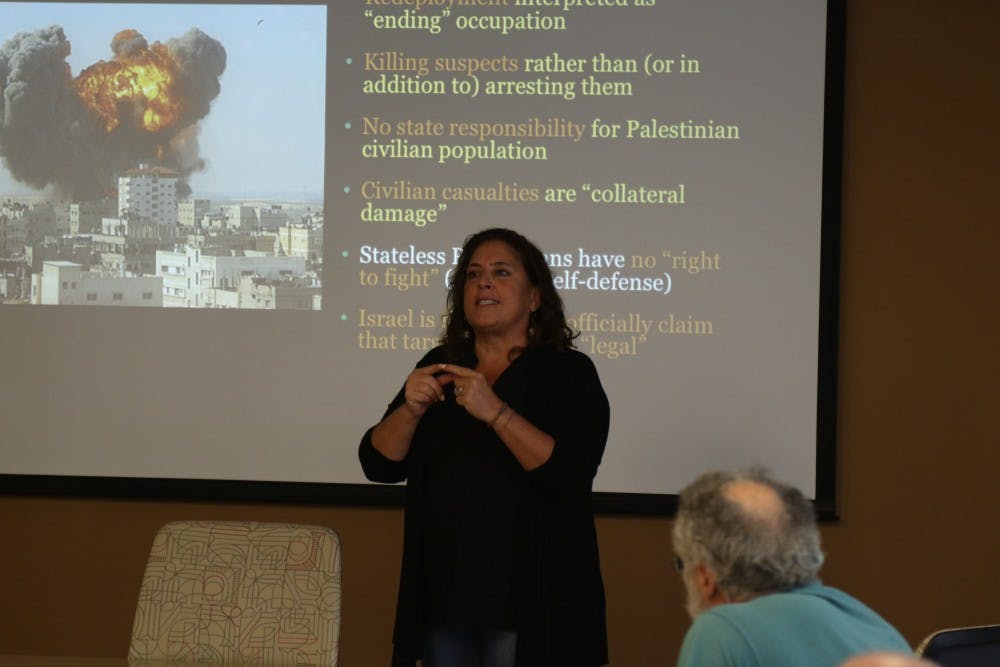International laws aim to restrict states’ behavior and protect civilians. But Israel’s 50 years of control over the West Bank and Gaza demonstrates that a state can reinterpret international law to serve its own interests, too.
Lisa Hajjar, professor of sociology at the University of California, Santa Barbara, examined the Israeli occupation of the West Bank and Gaza since 1967 through the lens of international humanitarian law (IHL) at a talk Friday. Hajjar’s talk was part of the speaker series that marks the 50-year-long occupation, sponsored by the Forum of Scholars and Publics, the Franklin Humanities Institute and the Duke University Middle East Studies Center.
“Israel is not disregarding the international law—it is reinterpreting it in ways that suit domestic interests and needs,” Hajjar said. “It is what I characterize as the ‘domestication of the international law’.”
Israel seized the Jordanian-controlled West Bank and Egyptian-controlled Gaza during the 1967 Arab-Israeli War, or the Six-Day War, Hajjar said. In the past 50 years, Israel has employed repressive military rule, issued discriminative policies and even committed violence against the Palestinian citizens who live in the two regions.
Hajjar explained that Israel’s military occupation of foreign territories and control on foreign citizens is subject to the regulation of IHL—a set of rules regulating war conduct. Its main body is found in the Geneva Conventions, which were ratified in 1949 in response to the large-scale violence that occurred in World War II.
“The laws and customs of war are millennia old,” she said. “But it was really in the 19th century that humanitarianism as an idea was born.”
The Geneva Conventions are based on the recognition that even enemies are human beings, Hajjar noted, with the goal of minimizing the unnecessary sufferings in a war. Some portions of the conventions require a state to distinguish civilians from combatants and to enact violence only to the necessary extent to win the war.
She said that at first, the Israeli government claimed the IHL did not apply to their occupation because the Six-Day War was not an inter-state war, as neither Egypt nor Jordan had claimed sovereignty on the territory it controlled at that time.
“The fundamental idea [behind this claim] is the Palestinian people who live in these territories had no claims and no rights under international humanitarian law,” she said.
Although the official attitude of the Israeli government shifted throughout time, Hajjar added that the belief continued to shape the policies Israel adopted in the West Bank and Gaza.
She noted that the Israeli military maintained law and order in the two areas through arrest, interrogation, massive imprisonment and even secret torture. In 1987, the state government punished the military officers who lied about their use of torture against the Palestinians but gave permission to use “moderate physical pressure.”
“This move made Israel the first state in the world to publicly authorize torture,” Hajjar said.
Israel withdrew its military from the West Bank and Gaza after the 1993 Israeli-Palestinian negations in Oslo. At the same time, long-repressed Palestinian groups such as Hamas started to enact suicide bombings against Israel, which led to targeted killings by the Israeli military.
Israel justified its attacks in 2000 by resorting to another interpretation of the international law, Hajjar said. The Israeli government claimed they were in a war against the Palestinians because the West Bank and Gaza had become foreign territories nominally, but the Palestinians had no rights to defend themselves because they were in effect stateless.
By portraying the conflict as a war, she explained, Israel no longer felt obligated to protect the residents in the West Bank and Gaza. When the Palestinian terrorists use the residents as human shields, the Israeli military initiated attacks indistinctly.
“These kind of interpretations [of the international law] further makes the Palestinians’ statelessness an increasing source of vulnerability,” Hajjar said. “But it also damages a core element of international humanitarian law, namely the distinction between combatants and civilians.”
Hajjar added that civilians are protected under any circumstances and that any deliberate attack on them is a war crime. But Israel asserts targeting individuals is acceptable when they identify the target as a imminent threat to their national security.
The United States adopted similar legal rationale to legalize torture and killings of individuals as part of its counter-terrorism efforts, Hajjar said.
“They are sophisticated legal arguments but they don’t enjoy international consensus,” Hajjar said.
Judy Glasser, a Jewish resident who attended the talk, said she was genuinely interested in Israeli-Palestinian relations and had been to the West Bank to learn more about the lives of Palestinians there. Glasser said Hajjar’s talk was logical and objective, offering a truly scholarly perspective on this issue.
Get The Chronicle straight to your inbox
Signup for our weekly newsletter. Cancel at any time.

